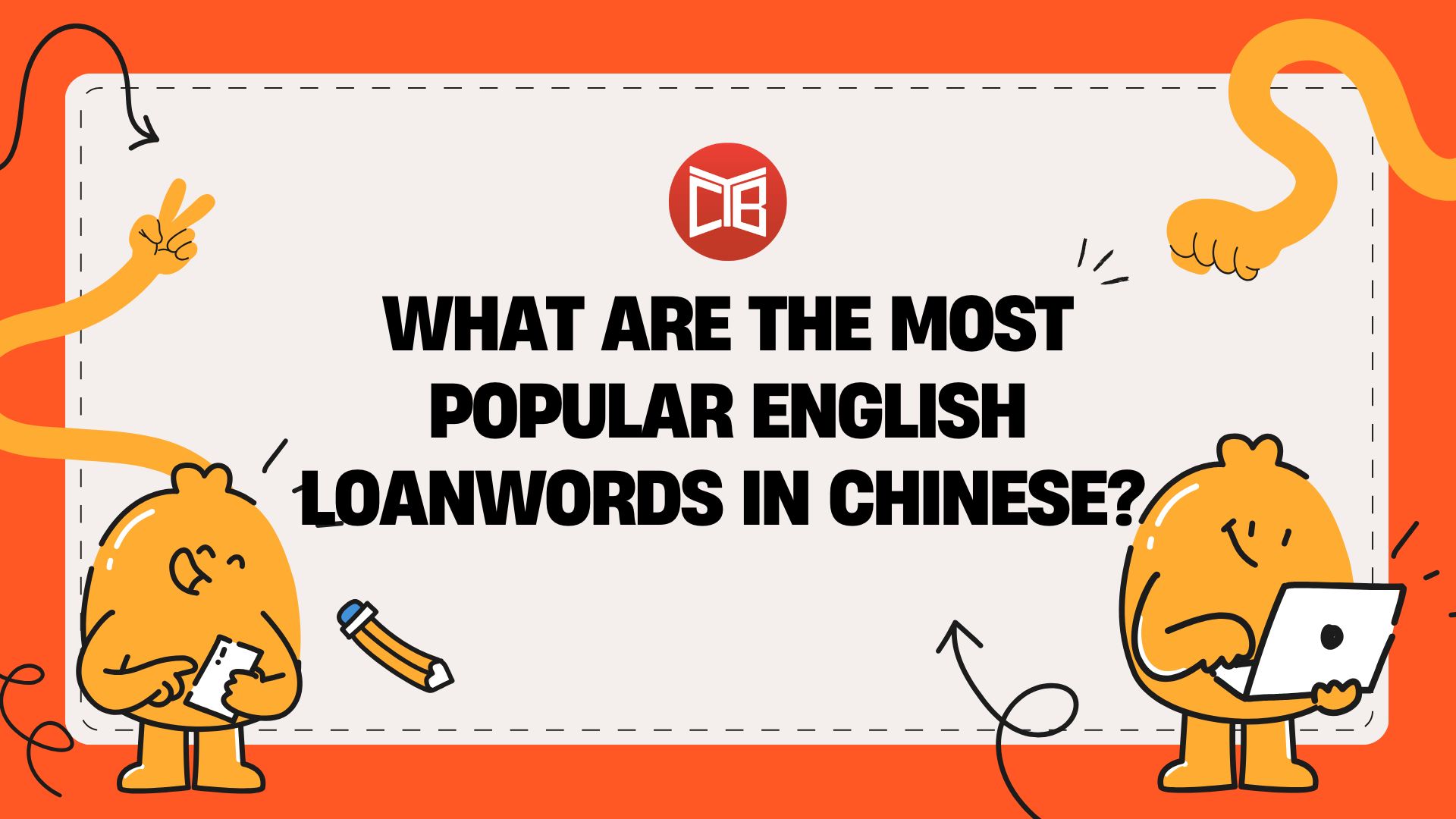
English Loanwords in Chinese: Are They Just a Trend?
哈罗(hā luō)!Ever ordered 咖啡 (kāfēi) to start off your day or said 拜拜 (bàibài) to a friend? Congrats, that means you’re already using some of the most common English loanwords in Chinese!
This linguistic mashup is your unique window into modern China, revealing how culture, tech, and trends are shaping the language in real-time. From your phone’s APP (ā pǐ pǐ) to the latest Internet slang, English words in Chinese are an unavoidable, fascinating part of the language.
This exchange is a two-way street. English has also borrowed words from Chinese, such as “typhoon” (台风, táifēng) and “ginseng” (人参, rénshēn), which have been used for centuries. More recently, foodies might talk about “wok hei” (镬气, huòqì), while business gurus emphasize “guānxì” (关系) for networking.
Ready to dive deep into the Chinese side of the story?
List of Food-Related English Loanwords in Chinese
No matter where you are from, I am sure we agree that food is a universal language, making it a major source for loanwords.
English loanwords also appear on menus and in cafés across China and Taiwan. These Chinese words borrowed from English you will find below are now so common they’re used across supermarkets and food apps.
- 咖啡 (kāfēi): coffee
- 可乐 (kělè): cola such as Coca‑Cola
- 奶昔 (nǎixī): milkshake
- 思慕雪 (sīmùxuě): smoothie
- 拿铁 (nátiě): latte
- 冰淇淋 (bīngqílín): ice cream
- 芝士 (zhīshì): cheese
- 起司 (qǐsī): cheese
- 沙拉 (shālā): salad
- 吐司 (tǔsī): toast
- 披萨 (pīsà): pizza
- 热狗 (règǒu): hot dog
- 三明治 (sānmíngzhì): sandwich
- 汉堡 (hànbǎo): hamburger
- 可颂 (kěsòng): croissant
- 巧克力 (qiǎokèlì): chocolate
- 布丁 (bùdīng): pudding
- 布朗尼 (bùlǎngní): brownie
- 威士忌 (wēishìjì): whiskey
- 白兰地 (báilándì): brandy
List of Common English Loanwords in Chinese Tech & Business
As technology connects the globe, its vocabulary has crossed borders seamlessly into the Chinese language. Here’s a list of some of the common English words in Chinese business and tech vocabulary:
- APP (ā pǐ pǐ): app or mobile application
- 黑客 (hēikè): hacker
- 博客 (bókè): blog
- 播客 (bōkè): podcast
- 激光 (jīguāng) / 镭射 (léishè): laser (The former is the formal term, while the latter is a phonetic loanword popular with younger generations)
- 云 (yún): cloud (storage)
- 软件 (ruǎnjiàn): software (Mainland)
- 软体 (ruǎntǐ): software (Taiwan)
- 逻辑 (luójí): logic
- 雷达 (léidá): radar
- 马达 (mǎdá): motor
- 热点 (rèdiǎn): hotspot
These Chinese words from English reflect how the language evolves to keep up with innovation.
List of Popular English Loanwords in Chinese Fashion & Lifestyle
English also influences how people talk about clothing, music, and entertainment. Here are examples of English loanwords in Chinese fashion and lifestyle:
- T恤 (T xù): T-shirt
- 酒吧 (jiǔbā): bar
- This is a clever match, combining the character for “alcohol” (酒) with the sound of “bar” (吧)
- 比基尼 (bǐjīní): bikini
- 夹克 (jiákè): jacket
- 迷你 (mínǐ): “mini” (used in compounds like 迷你裙, mini skirt)
- 派对 (pàiduì): party
- 模特 (mótè): model
- 高定 (gāodìng): high fashion / couture (short for 高级定制)
These Chinese words from English show how global fashion and lifestyle trends shape local language.
List of English Loanwords in Chinese Entertainment
Pop culture is another area where English has left a strong mark on everyday Chinese. From talk shows to internet memes, English loanwords are everywhere in entertainment, media, and informal conversations.
- 脱口秀 (tuōkǒuxiù): talk show
- 霸凌 (bàlíng): bullying
- 迷思 (mísī): myth
- 沙发 (shāfā): sofa
- 秀 (xiù): show (e.g., fashion show, talent show)
- 粉丝 (fěnsī): fans
- 模因 / 迷因 (móyīn / míyīn): meme
- 酷 (kù): cool
- 嗨 (hāi) or 哈罗 (hā luō): hello
These terms not only make communication more engaging but also reflect how English expressions have become part of Chinese youth culture and online identity.
List of Sports and Fitness English Loanwords in Chinese
The world of sports and fitness has also introduced many English words into Mandarin. As China embraced more global sports and wellness trends, we can find now many Chinese borrowed from English directly or adapted phonetically.
- 高尔夫 (gāo’ěrfū): golf
- 保龄球 (bǎolíngqiú): bowling
- 瑜伽 (yújiā): yoga
- 酷跑 (kùpǎo): parkour (a creative coinage mixing “cool” with “run”)
- 马拉松 (mǎlāsōng): marathon
- 卡路里 (kǎlùlǐ): calorie
- 阿司匹林 (āsīpīlín): aspirin
- 维他命 (wéitāmìng): vitamin
These Chinese words from English are now fully integrated into Chinese vocabulary about health and exercise.
List of English Loanwords in Chinese Internet Slang
The internet is where language evolves fastest, especially among young speakers. Using them correctly is a fast track to sounding current and culturally aware. Here is a list of some of the most popular examples explained in context.
-
Abbreviations & Acronyms: English words adapted into Chinese internet culture.
- DDL
- Chinese: 截止日期 (often written as “DDL”)
- Pinyin: jiézhǐ rìqī (or DDL to be pronounced letter-by-letter: dī-dī-ài-ōu)
- Meaning: Deadline
- Example: “DDL要到了,赶紧写作业!” (DDL yào dào le, gǎnjǐn xiě zuòyè!)
→ “The deadline is coming—hurry up with your homework!”
- CP
- Chinese: 配对/情侣档
- Pinyin: xī pì (from “C-P”: couple/-ship)
- Meaning: A fictional or real “couple” shipped by fans
- Example: “这对CP太好嗑了!” (Zhè duì CP tài hǎo kē le!)
→ “This CP is so addictive to ship!”
- yyds
- Chinese: 永远的神
- Pinyin: yǒngyuǎn de shén
- Meaning: “Eternal God” (Equivalent to “GOAT”)
- Example: “梅西,yyds!” (Méixī, yyds!)
→ “Messi is the GOAT!”
- PUA (Pick-Up Artist → psychological manipulation)
- Chinese: 精神控制
- Pinyin: pī-yōu-āi (letters pronounced separately)
- Meaning: Gaslighting / emotional abuse
- Example: “老板总贬低我,这是在PUA我!” (Lǎobǎn zǒng biǎndī wǒ, zhè shì zài PUA wǒ!)
→ “My boss keeps belittling me—this is emotional manipulation!”
-
Phonetic Borrowings: Chinese characters mimicking English sounds.
- EMO (Emotional)
- Chinese: 网抑云 (wǎng yì yún)
- Pinyin: yì-mōu-ōu (letters) or wǎng yì yún (full term)
- Meaning: Depressive mood (from NetEase Cloud Music’s sad comment sections)
- Example: “深夜听歌,我又EMO了。” (Shēnyè tīng gē, wǒ yòu EMO le.)
→ “Listening to songs late at night—I’m feeling EMO again. “
- 栓Q
- from Thank you
- Pinyin: shuān Q
- Meaning: “Thank you” (sarcastic/exasperated)
- Example: “又下雨了,栓Q。” (Yòu xià yǔ le, shuān Q.)
→ “Raining again? Thanks a lot.”
- 芭比Q
- from Barbecue
- Pinyin: bābǐ Q
- Meaning: “It’s over!” / Disaster (wordplay: 芭比Q sounds like 完了 wánle)
- Example: “手机掉水里,芭比Q了!” (Shǒujī diào shuǐ lǐ, bābǐ Q le!)
→ “My phone fell in water—it’s toast!”
-
Hybrid Terms (English Concept + Chinese Word)
- 社死
- Pinyin: shè sǐ
- Meaning: Social death (extreme embarrassment)
- Example: “在电梯里放巨响的屁… 当场社死。” (Zài diàntī lǐ fàng jù xiǎng de pì… dāngchǎng shèsǐ.)
→ “Farting loudly in an elevator… instant social death.”
- 下头
- Pinyin: xià tóu
- Meaning: Vibe-killer / turn-off
- Example: “他随地吐痰,真下头!” (Tā suídì tǔtán, zhēn xiàtóu!)
→ “He spat on the street—such a turn-off!”
How Are English Words Adopted into Chinese?
The process of adopting English words into the Chinese language, or creating loanwords, often happens when a word is needed for a new concept or when it carries a certain “cool” factor. For a loanword to become popular, it needs to be easy to say and feel culturally relevant. There are three main methods for this adoption:
- Phonetic Fit (Sounds Right): This is the most basic method, where Chinese characters are used to mimic the sound of the English word, like 沙发 (shāfā) for “sofa.” A more advanced version is phono-semantic matching, where the translation both sounds like the original and hints at the meaning. The most famous example is 可口可乐 (kěkǒu kělè) for Coca-Cola, which sounds similar and also means “tasty and enjoyable.”
- Semantic Fit (Makes Sense): This involves a direct translation of the English concept, also known as a “calque.” For example, 电脑 (diànnǎo) for “computer” literally means “electric brain,” and 热点 (rèdiǎn) for a Wi-Fi “hotspot” literally means “hot point.”
- Cultural Vibe (Feels Right): Sometimes, a loanword represents a new social behavior. Using 嗨 (hāi) or 哈罗 (hā luō) instead of the formal 你好 (nǐ hǎo) signals a casual, modern attitude and a connection to global youth culture.
A word fails if a good native option already exists (like 邮件 for email) or if it just sounds clunky. To survive, a loanword needs to be useful, sound good, or be cool—ideally all three.
Why You Should Learn English Loanwords in Chinese
For students of Mandarin, paying attention to English loanwords is a game-changing skill. It offers several key advantages for reaching fluency:
- You Will Sound More Natural: Using loanwords helps you sound more like a native speaker and less like a textbook. For example, instead of the formal “我必须在我的任务期限前完成这个项目” (wǒ bìxū zài wǒ de rènwù qīxiàn qián wánchéng zhège xiàngmù), a modern speaker would say “我必须在这个项目的DDL前把它搞定” (wǒ bìxū zài zhège xiàngmù de DDL qián bǎ tā gǎodìng), which means “I have to get this project done before my deadline.”
- You Will Unlock Cultural Secrets: Understanding modern loanwords gives you a deep insight into the social attitudes and anxieties of contemporary China.
- You Will Keep Up with Media: Loanwords are everywhere, from news headlines to viral Douyin videos. Understanding them is key to understanding what’s happening in China right now.
English Loanwords and Chinglish
It’s important to know that loanwords and what’s often called “Chinglish” are two totally different things. In fact, they’re opposite in direction:
- A loanword is an English word that’s become a natural part of Chinese. It’s a new Chinese word borrowed from English language.
For example, 咖啡 (kāfēi, coffee) or 酷 (kù, cool) started as English but are now used by native Chinese speakers in everyday, grammatically correct Chinese sentences. Think of a loanword as a new ingredient adopted into the Chinese linguistic “kitchen” – it blends in and locals know how to use it without thinking in English.
- Chinglish, on the other hand, is when Chinese linguistic patterns creep into English, causing awkward or humorous English phrases. It’s usually the result of direct translation or Chinese grammar applied to English. Classic examples: someone saying “Add oil!” as an English encouragement (from 加油, jiāyóu, which really means “keep going” or “you can do it”). Or the recent meme “you swan, he frog” – a word-for-word translation of a Chinese idiom 你是天鹅,他是青蛙 (“you’re a swan, he’s a frog”), meaning “she’s out of his league.” It makes native English speakers scratch their heads, yet it delivers the message in a quirky way and often goes viral for its silliness.
So, loanwords ≠ Chinglish. Loanwords enrich Chinese by bringing in foreign terms that people use naturally (no grammar mistakes involved), whereas Chinglish is more about errors or oddities when using English. One (loanwords) is a sign of language growth; the other (Chinglish) is usually just a humorous mistake. Both show the interplay between Chinese and English, but in very different directions.
FAQ: Your Loanword Questions, Answered
Q1: What are the most popular English words in Chinese?
Common examples of popular Chinese words borrowed from English include:
- 咖啡 (kāfēi): coffee
- 酷 (kù): cool
- APP (ā pǐ pǐ): app
- 粉丝 (fěnsī): fans
- 拜拜 (bàibài): bye-bye
- 嗨 (hāi) / 哈罗 (hā luō): hello
Q2: Why do people say 拜拜 (bàibài) instead of 再见 (zàijiàn)?
It’s all about informality. 再见 is perfectly fine, but it can feel a bit stiff, like saying “farewell.” 拜拜 is the equivalent of “bye!” or “see ya!”—it’s friendly, casual, and universally understood for ending a phone call or leaving a friend’s place.
Q3: Is it okay to use English loanwords such as 嗨 (hāi) or 哈罗 (hā luō) instead of 你好 (nǐ hǎo) in Chinese?
Absolutely, but in the right context! Think of 你好 as a polite handshake and 嗨/哈罗 as a friendly wave, especially in informal situations or online chats. 嗨 has become a go-to greeting among younger generations.
So, Are English Loanwords in Chinese Just a Trend?
Definitely not. Loanwords are a living proof of how people connect. These words, like 摩登 (módēng -“modern”) in 1920s Shanghai and 元宇宙 (yuán yǔzhòu – “metaverse”) today, demonstrate how connected our worlds have grown. English loanwords in Chinese reflect cultural change, modernity, and everyday life. Whether you’re sipping a latte (拿铁, nátiě) or dreading a DDL, these terms are here to stay.
So go out there, be 酷, and don’t be afraid to sprinkle some of these words into your next conversation! They might be words borrowed from English, but they’re 100% Chinese now.
拜拜!
Author:

Fabia Parodi
Fascinated by foreign languages and cultures, Fabia Parodi was determined to be a polyglot since she was a child. Fluent in Italian, English, French and Spanish and competent in Mandarin Chinese, Fabia is an experienced language teacher, translator and multicultural marketing specialist.
When in class, she always make sure to include graded and authentic materials in her lessons to expose students to foreign cultures and to introduce a more natural use of the language they are learning. The two things she loves more than languages are travelling and exchanging stories with people from all over the world.























